Duglas Surname Ancestry ResultsOur indexes 1000-1999 include entries for the spelling 'duglas'. In the period you have requested, we have the following 74 records (displaying 11 to 20): Single Surname Subscription | | | Buying all 74 results of this search individually would cost £434.00. But you can have free access to all 74 records for a year, to view, to save and print, for £100. Save £334.00. More... |
These sample scans are from the original record. You will get scans of the full pages or articles where the surname you searched for has been found. Your web browser may prevent the sample windows from opening; in this case please change your browser settings to allow pop-up windows from this site. Prisoners in the Tower of London
(1580)
Sir Owen Hopton, the Lieutenant of the Tower of London, submitted quarterly claims for the expenses of keeping the political and religious dissidents (mostly Roman Catholic recusants) in his charge - a 'keeper' at 5s a week, fuel and candles at 4s a week, and for himself 13s 4d a week, for each prisoner. Those who died in prison or were executed during the period are marked with the word 'mort.' This is the return for Lady Day 1580.DUGLAS. Cost: £4.00.  | Sample scan, click to enlarge
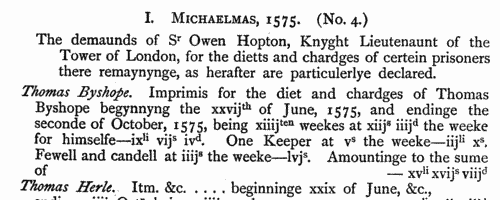
| Secretary of State's Papers
(1601)
The letters and papers of sir Robert Cecil, Secretary of State, deal with all manner of government business in England, Ireland and abroad.DUGLAS. Cost: £4.00.  | Sample scan, click to enlarge
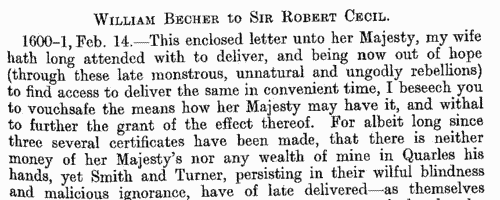
| Middlesex Sessions
(1549-1603)
This printed calendar collates a number of surviving records from Middlesex sessions for the period. Principally these are the Gaol Delivery Rolls (G. D. R.) and the General Sessions of the Peace Rolls (G. S. O. P. R.). Both series cover general criminal indictments (bills) together with the recognizances of the witnesses to attend; but the Gaol Delivery Rolls, by their very nature, tend to deal with the more serious cases - felonies where the accused could not be released on bail. The General Sessions rolls also include the sheriff's lists of bailiffs, sub-bailiffs, high and petty constables in the shire; writs of venire facias for production of jurors, writs of capias, lists of jurors, jury-panels &c. The Gaol Delivery Rolls also include coroners' inquests, writs of supersedeas, and memoranda of proclamations. Special inquiries are recorded in separate Sessions of Oyer and Terminer (S. O. T.) rolls and Inquest or Inquisition rolls (I. R.) Although coverage is good, none of the sequences of rolls for this period is complete. A peculiarity of this calendar is that in the case of actual incidents, the date given at the start of each entry is the date that the incident was alleged to have taken place (for instance, 1 June 11 Elizabeth (1569) in the sample scan) rather than the date of the court proceedings. DUGLAS. Cost: £4.00.  | Sample scan, click to enlarge

| Liegemen and Traitors, Pirates and Spies
(1623-1625)
The Privy Council of James I was responsible for internal security in England and Wales, and dealt with all manner of special and urgent matters
DUGLAS. Cost: £4.00.  | Sample scan, click to enlarge

| Inhabitants of Cambridge
(1504-1635)
Cambridge comprised fourteen ancient parishes, plus the university (which was extra-parochial), in the diocese of Ely. The church of St Mary the Great (as opposed to St Mary the Less) in the Market Place (juxta forum) has churchwardens' accounts surviving from 1504 onwards. Those from 1504 to 1635 were transcribed by J. E. Foster for the Cambridge Antiquarian Society and published in 1905. The two churchwardens were chosen annually: the previous year's churchwardens each chose another parishioner: those two then each chose three other parishioners: the resulting eight then chose the new year's churchwardens, the wardens of the Light of the Rood, and the wardens of the Mass of Jesus. Auditors were also chosen, usually out of the eight, to examine all the wardens' accounts at the end of the year. The churchwardens' accounts are largely concerned with the costs of repair of the church and its furnishings, and include the names of tradesmen and workmen. Each Easter a rate called Easter money was raised was raised from all householders in the parish, and additional rates are occasionally levied for unusual expenses, such as steeple reconstruction. These 'Easter book' lists give a complete list of householders for the parish, excepting the poor. The church's income also included the rents from some houses in the parish, and the names of the tenants appear. The offices of the Light of the Rood and the Mass of Jesus were abolished during the Reformation. The accounts of the Light of the Rood, i. e., for candles burnt before the crucifix, often include a list of sums received for funerary diriges (dirges) for the year, from which the year of death of the more prosperous parishioners can be traced in this early period. DUGLAS. Cost: £4.00.  | Sample scan, click to enlarge

| England and Venice
(1642-1643)
The Master of the Rolls directed the compilation of translations of archives from northern Italy relating to English affairs. This volume, edited by Allen B. Hinds and published in 1925, is partly based on transcripts in the Public Record Office in London of major sources from the state archives housed in the Frari at Venice, and partly taken directly from the originals, in particular the Dispacci, Inghilterra. Much of this volume, covering March 1642 to July 1643, consists of the letters of Giovanni Giustinian the Venetian ambassador in England, and of Gerolamo Agostini, the Venetian secretary there; and as such contain descriptions of unfolding political events in Britain and northern Europe as seen by Italian diplomats. But there were also Englishmen actively trading with Venice and its sphere of influence in the eastern Mediterranean, and these too are mentioned from time to time.DUGLAS. Cost: £4.00.  | Sample scan, click to enlarge
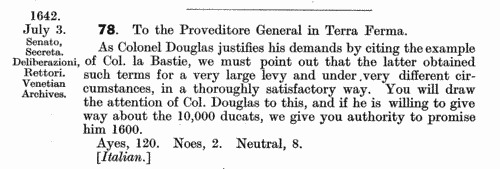
| PCC Probates and Administrations
(1646)
The Prerogative Court of Canterbury's main jurisdiction was central and southern England and Wales, as well as over sailors &c dying abroad: these brief abstracts, compiled under the title "Year Books of Probates", and printed in 1906, usually give address, date of probate and name of executor or administrator. They are based on the Probate Act Books, cross-checked with the original wills, from which additional details are, occasionally, added. The original spelling of surnames was retained, but christian and place names have been modernised where necessary.DUGLAS. Cost: £2.00.  | Sample scan, click to enlarge
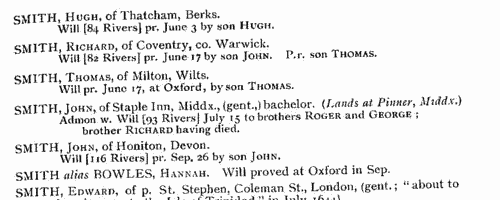
| England and Venice
(1643-1647)
The Master of the Rolls directed the compilation of translations of archives from northern Italy relating to English affairs. This volume, edited by Allen B. Hinds and published in 1926, is largely based on transcripts in the Public Record Office in London of major sources from the Venetian archives, in particular the Dispacci, Inghilterra. Most of this volume consists of the letters of Secretary Agostini from London, the Advices of London forwarded from Paris, and the Esposizioni Principi; and as such contain descriptions of unfolding political events in Britain as seen by Italian diplomats. But there were also Englishmen actively trading with Venice and its sphere of influence in the eastern Mediterranean: Venice was struggling with the Turks for possession of Candia (Crete), and English merchants, mercenaries and ships were involved on both sides. There is even the report of a raid by Barbary pirates on the Cornish coast in which 200 women were carried off for slaves.DUGLAS. Cost: £4.00.  | Sample scan, click to enlarge
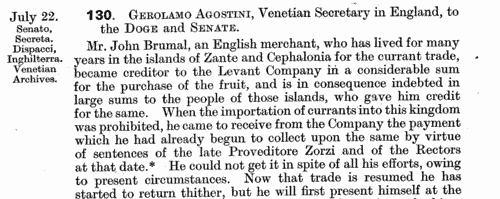
| Besiegers of Colchester
(1648)
The siege of Colchester was one of the most severe of the Civil War, and lasted from 14 June to 28 August 1648. Kent and Essex Royalists on their way into Norfolk and Suffolk turned aside into Colchester, hoping to get recruits there. Fairfax pursued from his headquarters in London, and when on 12 June he appeared with 5,000 men they were obliged to make hasty preparations for defence. The town was ill-fitted to stand a siege, and the 4,000 Royalist troops were most of them newly levied and ill-armed, but after a repulse on 14 June 14, Fairfax realized that a long siege was inevitable, and busied himself with raising forts to completely isolate the town. On 2 July the work of circumvallation was finished, and though meeting with fierce resistance, Fairfax gained post after post. Early in August famine added to the misery of the besieged, and the citizens began to clamour for surrender. On 19 August, Norwich, the Royalist leader, asked for terms; negotiations went on for some days, and finally on 28 August, Fairfax occupied the town. Three of the Royalist leaders were shot, and the soldiers were sent to labour in the West Indies, or to enforced military service under the Venetian Republic. The townsmen were made to pay a heavy fine.
These accounts list disbursements to workmen digging the fortifications and to artificers, soldiers and officers involved in the siege. The total sum paid was about £1,695.
DUGLAS. Cost: £4.00.  | Sample scan, click to enlarge

| Massachusetts Bay freemen
(1642-1649)
The Company of the Massachusetts Bay in New England was established by royal charter in 1629, the area being settled from 1630 onwards; the charter was withdrawn in 1684. The colony at this period did not include Plymouth or Maine. This court book, compiled by the Increase Nowell, company secretary, also includes memoranda concerning land grants and disputes, official appointments, &c. It was edited by Nathaniel B. Shurtleff, and printed by order of the legislature of the Commonwealth of Massachusetts in 1853. Months are given in the dating in Puritan fashion, i. e. March is 1mo, April 2mo, &c. The lists of names of those taking oaths as freemen of the colony were printed separately, and are listed here.DUGLAS. Cost: £4.00.  | Sample scan, click to enlarge

|
Research your ancestry, family history, genealogy and one-name study by direct access to original records and archives indexed by surname.
|












